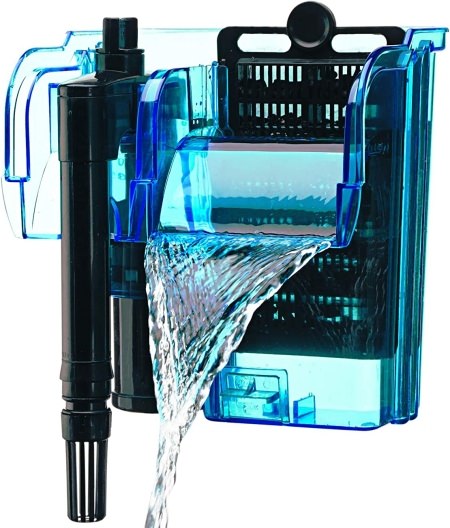| Back to Back Issues Page |
 |
|
The Goldfish Gazette, Issue #105 Aeration and Water Currents September 28, 2022 |
Goldfish Care TipsA Free Monthly Resource For Goldfish Enthusiasts In This Issue Water with a high concentration of dissolved oxygen (DO) is beneficial for Goldfish health. Low concentrations stress Goldfish leading to disease. Aeration and Water Currents
Surface agitation provided by filterIt is at the water surface where the exchange of oxygen and carbon dioxide takes place.If the surface is covered with a barrier such as an algal film or plant life, and/or there is little surface agitation, the gaseous exchange will be poor. Healthy water should have a dissolved oxygen (DO) level of above 6 ppm (parts per million) mg/L (milligrams per liter). Goldfish are known to survive at as low as 1-2 ppm but they will be stressed. Some fish species can’t survive below 6.5 ppm. The Aquarium EnvironmentConditions that deplete DO in water are:High fish numbers High water temperature Decaying matter Low water surface agitation Water depth Salinity level. All these conditions can be present in an aquarium environment, and with climate changes causing elevated summer water temperatures, the need to maintain a good DO level in our aquariums and ponds is now more important than ever. Signs Of Low Dissolved Oxygen LevelThe most obvious sign is if all your fish are continually at the surface accompanied by rapid gill movements (gasping).You need to act quickly as something has changed in the aquarium or pond that has caused a rapid depletion in DO. In winter it can be caused by ice covering the pond, or in summer it can be a bacterial population explosion caused by water pollution or water stratification in deep ponds. Filters and Water Surface AgitationYou don’t really need separate aeration if you have a filter installed that will agitate the water surface.Some filters by their design agitate the water surface as the filtered water returns to the aquarium. Examples are hang-on-back (HOB) or sponge filters. Some are not so good at this. An example of this would be a canister filter that has an outlet below the water line. Little surface agitation is created, no matter how big the filter is. Most canister filters come with a spray bar for this purpose, but many are not fitted because of splashing concerns. Water CurrentsAs I have mentioned previously, you can never over-filter an aquarium or pond, but you can certainly under-filter one. For this reason, I always use filters rated for at least twice the size of aquarium or pond I have it installed in.There is a downside to this, water currents. The ability of a single-tailed variety to swim against a strong current compared to most fancy varieties is considerable. There should be little water current in a pond or aquarium containing fancy Goldfish. Your Goldfish shouldn’t be constantly fighting against a current, it stresses them. If they all gather in a corner or to one side of the aquarium or the current pushes them around when they stop swimming, the current is too strong. Your Goldfish should actively swim throughout the entire aquarium. Another downside of a strong current is your fish use a lot of energy fighting the current instead of using it for growth. This is why I favor sponge filters for fry and juveniles. The rising air bubbles exit the filter tube high up the water table agitating the water surface but creating little current down the bottom. Comments? Ideas? Feedback? I'd love to hear from you. Just reply to this e-zine and tell me what you think, or what topics you want to be covered. Next Month's Topic Feeding competitionwww.facebook.com/aboutgoldfish |
| Back to Back Issues Page |